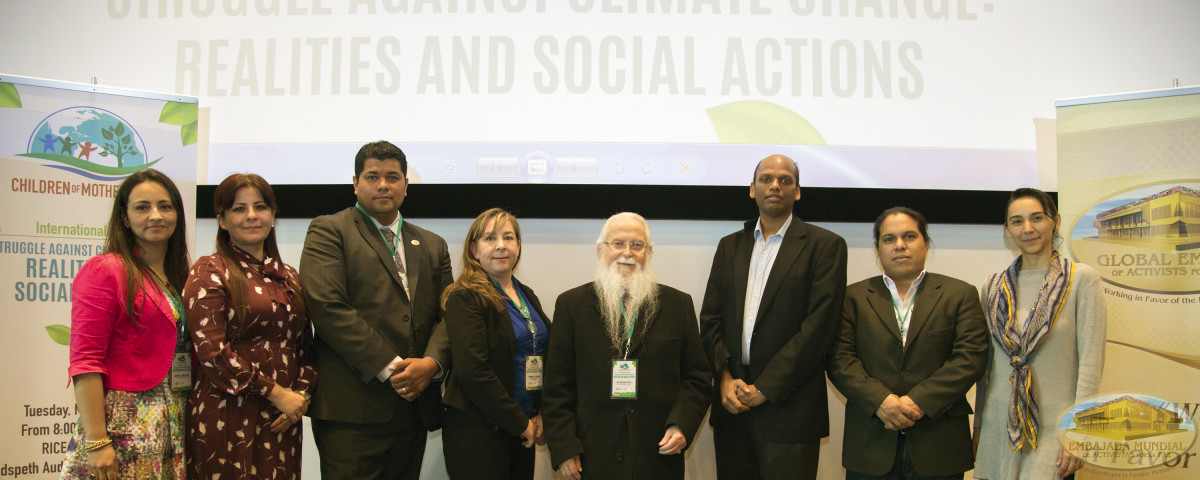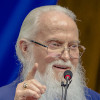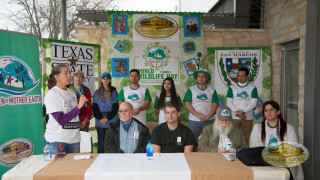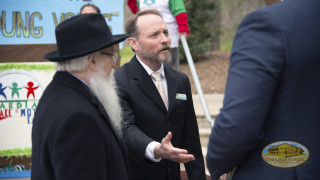Struggle against climate change: social realities and actions
The Forum was held in Houston, Texas
To speak on the realities of climate change and chaos, and of some of the social actions to stop and mitigate its consequences, from different points of views such as: political-legal, citizen action and education, was the purpose of the Forum “Struggle against Climate Change: Social Realities and Actions”, in the installations of Rice University in Houston, Texas, on March 7, 2017.
With the collaboration of the Center for Energy and Environmental Research in Human Sciences, the Global Embassy of Activists for Peace organized said forum, within the framework of its International Program Children of Mother Earth. Important experts on climate change, health, social activism and environmental professors participated in the event.
Climate change or chaos: an overwhelming reality
The Intergovernmental Panel on Climate Change (IPCC) of the United Nations, published a report in 2014, where it showed that in the last 130 years, the world has warmed by approximately 0.85 oC. Each of the last 3 decades has been successively warmer than any preceding decade since 1850.
This phenomenon of climate change throughout the history of mankind has been produced by natural causes, but parting from the Industrial Revolution, the hand of man has influenced and accelerated this process of global climate change, provoking, as the indigenous people say, CLIMATE CHAOS.
The truth is that climate change or chaos is a reality. And its consequences on human life is being studied by experts in different scientific and humanistic fields.
Social realities and actions in the struggle against climate change
The Global Embassy of Activists for Peace, through its International Program Children of Mother Earth, organized the Forum “Struggle against Climate Change: Social Realities and Actions”, with the participation of distinguished experts on the proposed topics, who gave keynote conferences on the issues and solutions from different points of views.
The forum began with a greeting from Mrs. Andrea Galindo, coordinator of the Center for Energy and Environmental Research in Human Sciences, who thanked the presence of all the panelists and hoped for a successful event.
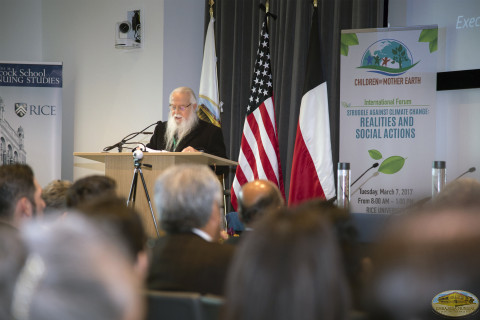 The first conference was given by Dr. William Soto Santiago, executive president of the Global Embassy of Activists for Peace, with the title: “The struggle against climate change and chaos: seeking peace for Mother Earth and mankind.” With an approached aimed at relating climate change and its influence on the emotional and physical health of human beings, Dr. Soto stated the need to break the self-destructive cycle which mankind has entered, taking into consideration that humans are the principle cause of climate change or chaos:
The first conference was given by Dr. William Soto Santiago, executive president of the Global Embassy of Activists for Peace, with the title: “The struggle against climate change and chaos: seeking peace for Mother Earth and mankind.” With an approached aimed at relating climate change and its influence on the emotional and physical health of human beings, Dr. Soto stated the need to break the self-destructive cycle which mankind has entered, taking into consideration that humans are the principle cause of climate change or chaos:
“We need to reconstruct that love through contact and interaction with nature. It is necessary for humans to comprehend that their health and physical well-being depend on the ecological equilibrium of Mother Earth.
(…) It is time to break that cycle and restore the linking bond of love, comprehension, of mutual protection with our Mother Earth. It is time to mature and accept that we have made mistakes, but that it is time to make things right and to help restore the damage we have caused our Mother Earth.”
Panel of experts on Climate Change
Next, the first panel of experts was conformed, with Dr. Susan Pacheco, Associate Professor of the University of Texas Health Pediatrician, McGovern Medical School; and Dr. John B. Anderson, professor and a member of the Earth Science Wiess School of Natural Science, Rice University.
Dr. Pacheco spoke on the topic: “The impact and consequences of climate change on human beings and Mother Earth”. Strong scientific evidence was shown by Dr. Pacheco to illustrate how climate change has caused in humans, and animal and vegetable species, an increment in tropical diseases, allergies, among other health problems:

“What do we do? Do we have reason for hope? Yes, you see the Paris Agreement. Do we have reason for hope here? You bet, because we’ve come as a group of individuals, many of us didn’t know each other and now we are going to establish networks and we are going to share our knowledge and resources.”
“Educating to counteract climate change”, was the topic given by Dr. John B. Anderson. Using explanatory slides with profuse statistical data, Dr. Anderson explained that it is necessary for more educators to prepare themselves in evidence on the consequences that climate change has in human life and on Mother Earth:
“I applaud your attempts and your efforts to point out that humans have to live in harmony with the Earth. I don’t think you will disagree with the scientific community on that one at all. And, so there is a lot of harmony here between the indigenous people and what the scientific community believes.”
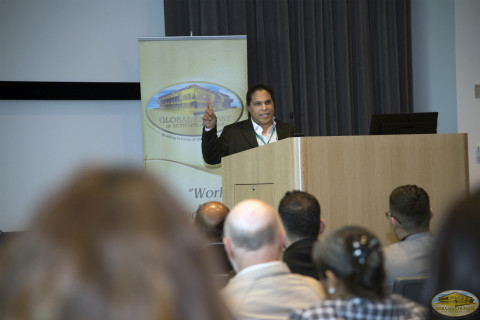 Mr. Bryan Parras, representing the Texas Environmental Justice Advocacy Services (T.E.J.A.S) organization, participated and presented a video that shows the solidary work carried out by his organization in communities, fighting against the effects of contamination and climate change. He expressed his concern for all of us to reconnect with our indigenous roots, and thus, with Mother Earth:
Mr. Bryan Parras, representing the Texas Environmental Justice Advocacy Services (T.E.J.A.S) organization, participated and presented a video that shows the solidary work carried out by his organization in communities, fighting against the effects of contamination and climate change. He expressed his concern for all of us to reconnect with our indigenous roots, and thus, with Mother Earth:
“We’ve seen a lot of people die, I’ve had to witness a lot of sick people fight and struggle for their lives and often times they are young children who don’t deserve that. I think we can all agree about that. We are all indigenous to some part of this planet. We may have been by force, by strategy, by whatever means, have lost that connection to our indigenous roots, our connection to Mother Earth, our very real human respect for this place that we call home and that we live on. But we can get that back.”
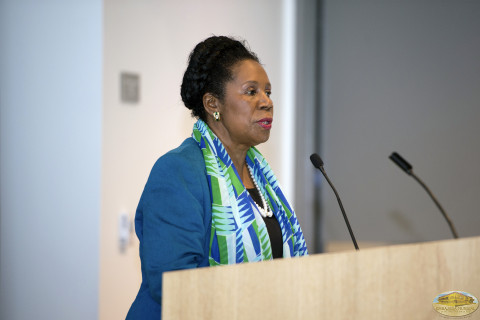 Mrs. Hannah B. Jurado, expert in environmental controls, gave a master lecture on the topic: “Visualizing environmental change through a sustainable development”, highlighting the opportunity we have to take advantage of scientific discoveries and contributions from governmental agencies related to the environment and space science, to conceive different ways of approaching the issue that is climate change:
Mrs. Hannah B. Jurado, expert in environmental controls, gave a master lecture on the topic: “Visualizing environmental change through a sustainable development”, highlighting the opportunity we have to take advantage of scientific discoveries and contributions from governmental agencies related to the environment and space science, to conceive different ways of approaching the issue that is climate change:
“Though it may take time, we are sharing that knowledge through education and applying that knowledge through sustainability. And I really believe that we can contribute to positive environmental change and yield effective results.”
Congresswoman Shelia Jackson Lee, from the state of Texas, had a special participation, summarizing the efforts the legislators of the United States have made to emit legal and public regulations to counteract the effects of climate change:
“Climate change is the challenge of our lifetime. It is crucial for us to be concerned about climate change and the impact on the world population. In this century we are seeing the impact of climate change. I think action involves you in your local community council, it involves you in your county commissioner’s court if you live here. But more importantly, it involves you in your national government, no matter what country you live in.”
The last conference was given by Dr. Marthi Bhaskar, Ph.D., a member of the Environmental and Interdisciplinary Sciences of Texas Southern University. His lecture was aimed at creating an analysis of how climate change has affected fresh water sources, and their importance for life: 
“Water is very important. It is not only the water, but the water quality is more important, for all the living organisms, we need water for our existence. And we need clean water for our existence. So, the climate change is very much… is influencing a lot the water quality, the availability of the water and the water quality and how it is going to impact the life of the living organisms.”
These conferences will be compiled and edited for the purpose of making them available through the webpage of the Global Embassy of Activists for Peace, to all those interested in learning more on this topic and to be used in an educational manner.
